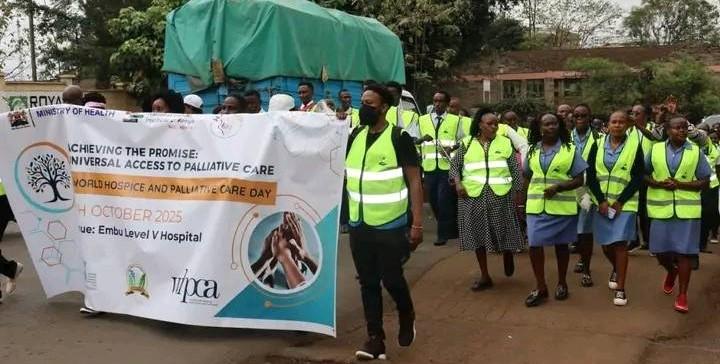
Kenya Hospices and Palliative Care Association (KEHPCA) has raised alarm over the exclusion of thousands of patients with life-threatening illnesses who rely on home-based care in Social Health Insurance (SHA) scheme.
The association argued that restricting palliative care for inpatient services had left the vast majority of patients under home palliative care in a precarious state.
Speaking during the World Hospice and Palliative Care Day 2025 celebrations held at Embu Level Five Hospital on Wednesday, KEHPCA Director David Musyoki said SHA being the Universal Health Coverage (UHC) body in the country should guarantee full coverage for critical patients whether inpatient or under home-based care.
He said the shortfall in care has been compounded by severe shortage of essential painkiller drugs in hospitals that has caused significant stress to patients’ including those with cancer.
Musyoki attributed that stock-out of pain relief drugs to a tedious procurement process from the Kenya Medical Supplies Authority (KEMSA), leaving patients, including those with cancer, to endure prolonged and unnecessary pain.
Additionally, the director said lack of trained medical staff has exacerbated the challenge, noting that many nurses and clinical officers lacked proper training to prescribe and manage these essential pain medications for palliative care patients.
“The combination of financial barriers, drug shortages and staffing has significantly added to the suffering for the critical care patients,” he said.
Meanwhile, Head of the Division for Health Aging and Palliative Care in the Ministry of Health Dr Rosie Wafula highlighted the persistent stigma faced by patients with life-threatening conditions.
Dr Wafula urged families to provide necessary support to such patients as she outlined the Ministry’s Policy Framework for 2021-2030, which aims to decentralise palliative care and make it accessible at the grassroots level.
The event also spotlighted local successes, with Embu County cited as an example of progress whereby palliative care services has scaled up services to about 40 patients per day compared to just two a decade ago.
Despite such improvements, patients in attendance voiced their struggles with Nelson Nyaga, a prostate cancer patient, lamenting over the high cost of treatment and the persistent lack of essential drugs in public health facilities.
He described palliative care as essential for navigating his difficult health battle and called on the government to intervene and ensure access to the treatments needed for a quality life.
A Tell Media / KNA report / By Samuel Waititu







